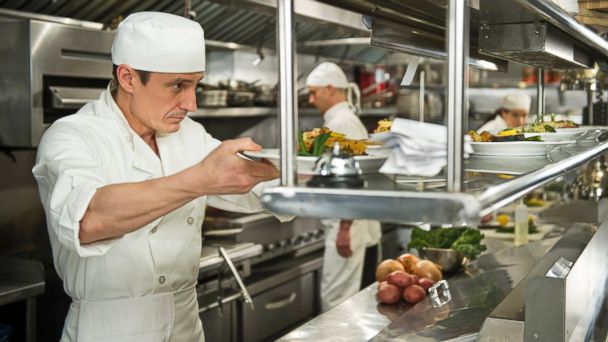10 Things Restaurants Won't Tell You

Specials are often designed to drive check averages higher.
Turns out when you get the feeling that a restaurant is pulling something over on you, it's because it probably is. Urbanspoon revealed 10 restaurants secrets, and some of these industry practices may surprise you-but some may be things you figured out already. Read on to prevent being burned in the future.
The surprising:
The second-cheapest bottle of wine is marked up the most: Think you're pulling a fast one by choosing the second-cheapest bottle of wine on the list so you don't look too thrifty? Think again. Restaurants have caught on to this maneuver, and thus make that bottle the one they make the most money on. Just give in to your stingy side and order the least expensive one. Who cares if they judge?
Wait times are made up: Which is why a 15-minute guess can stretch to 30, or vice versa. Hosts just quote their best guesses, and they're often better off making it longer so that you're pleasantly surprised when your table is ready far faster than you thought. And, the longer they quote, the more likely you are to sidle up to the bar and order a cocktail, which is a restaurant's true money maker.
Restaurants re-use your half-drank bottle of wine: The dregs are recycled into next-day by-the-glass specials or given to the kitchen to use in specials. Get your money's worth and take home a bottle that's still half full-you paid for it, after all!
The not-so-surprising:
Your server is probably lying to you: That special she claims is "amazing?" She was incentivized to do so, often in the form of prizes to who sells the most. Specials are often designed to drive higher check averages and make sure extra food doesn't go to waste, so a restaurant wants them to sell, sell, sell.
And your server knows when you're lying to her: Sure, your allergy to cilantro may be real. Or it could be you just hate the stuff. Unfortunately the liars are ruining it for those who are actually medically allergic to something, so let's all make nice and just be honest.
Homemade can be more like half-made: Oftentimes food can actually be homemade. But in whose home? A restaurant can get its pastries delivered, yet they were homemade somewhere, right? And some places may doctor up a pre-made vinaigrette or sauce by adding a few ingredients and calling it their own.
Your lemon water is kind of dirty: Sliced lemons for water and iced tea just might be one of the restaurant's dirtiest spots. Often unwashed and kept by the kitchen's exits, up to two-thirds of restaurant lemons are contaminated with bacteria, according to studies. And, staff will usually just grab a slice with their bare hands that handle cash and dirty plates. You sure you want lemons in that?
The obvious:
Servers procrastinate, too: Just like you take advantage of slow days at work to beat your Candy Crush high score, gossip with coworkers, and fine, sometimes catch up on busy work, so do waiters. Whether they're actually getting their side work (like polishing wine glasses) done or sucking up to the pastry chef for a taste of dessert, servers take advantage of slow shifts. Good luck getting that water refill on a night when the place is empty.
That coffee you ordered for an energy boost post-dinner is probably decaf: Sorry to disappoint, but at night, whether you order regular or decaf, it's basically a crap-shoot which you'll actually get. If it's late at night or super busy and one is out, waiters often just grab what's available and serve.
The menu is designed to make you spend more: By putting the price directly next to a dish description and leaving off the dollar sign, restaurants can draw attention away from how much a meal costs. And, studies show that boxing or making a dish more prominent will lead to more orders, so a menu will often highlight dishes that have the highest profit margin for a restaurant.